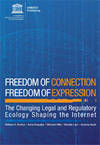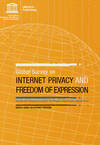Publications
Conflict-sensitive reporting: state of the art; a course for journalists and journalism educators
Written by Ross Howard, who teaches journalism at Langara College in Canada and is the President of the non-profit Media and Democracy Group, the Curriculum provides guidance to a better understanding of conflict and conflict resolution and the news media’s role.
Freedom of connection, freedom of expression: the changing legal and regulatory ecology shaping the Internet
This report provides a new perspective on the social and political dynamics behind the threats to expression. It develops a conceptual framework on the ‘ecology of freedom of expression’ for discussing the broad context of policy and practice that should be taken into consideration in discussions of this issue.
Freedom of expression, access to information and empowerment of people
This book is a compilation of contributions by the participants of the conference held in Maputo, Mozambique, in May 2008, on the occasion of World Press Freedom Day. A wide variety of authors, from journalists to academics and civil society, express their views on how freedom of information and freedom of expression can help people gain control over their lives.
Freedom of expression and broadcasting regulation
This study, written by international experts, Toby Mendel and Eve Salomon, provides content for reflection on the centrality of regulation for the protection, promotion and guarantee of the right to receive, seek and impart information, ideas and opinions.
Global survey on internet privacy and freedom of expression
This publication seeks to identify the relationship between freedom of expression and Internet privacy, assessing where they support or compete with each other in different circumstances. The book maps out the issues in the current regulatory landscape of Internet privacy from the viewpoint of freedom of expression. It provides an overview of legal protection, self-regulatory guidelines, normative challenges, and case studies relating to the topic.
Guidelines for journalists
Regularly updated folder covering the election process in Iraq
This folder contains the first editions of what will become a regularly updated package of documents covering the election process in Iraq. New editions will be made available on a regular basis. The system is simple. As new sections are published and distributed, just remove the out-of-date section and replace it with the new one.
Handbook for journalists
Reporters Without Borders (with UNESCO) has compiled a Handbook for Journalists for those going to dangerous parts of the world, listing international norms protecting them and containing practical advice on how to stay alive and safe.
Libertad de expresión
Published by UNESCO’s Office in Quito, this comic book illustrates the main principles and concepts of freedom of expression and press freedom in an accessible, easy-to-understand language.
Libertad de Prensa, Acceso a la Información y Empoderamiento Ciudadano: seminario internacional
Esta publicación reúne las ponencias y discusiones desarrolladas en el marco del Seminario “Libertad de Prensa, Acceso a la Información y Empoderamiento Ciudadano”, celebrado en ocasión del Día Mundial de la Libertad de Prensa 2008, organizado por la Oficina Cluster MERCOSUR de UNESCO con la participación de conferencistas de los países del MERCOSUR Argentina, Brasil, Paraguay, Uruguay, y conectado por video conferencia con panelistas de Chile y España.
Media and good governance
Since its inception, UNESCO has been defending the right to “seek, receive and impart” information. To celebrate World Press Freedom Day 2005, held in Dakar, Senegal, UNESCO chose “Media and Good Governance” as the key theme, eliciting the wide range of views that have been adapted to form this book.
New media: the press freedom dimension, challenges and opportunities of new media for press freedom
This book is a record of an international conference “New Media: The Press Freedom Dimension Challenges and Opportunities of New Media for Press Freedom”, which took place at UNESCO Headquarters from 15 to 16 February 2007.
Press freedom and development: an analysis of correlations between freedom of the press and the different dimensions of development, poverty, governance and peace
This study is the outcome of a research project implemented by the Centre for Peace and Human Security (CPHS) at Sciences Po University with support by UNESCO. The research has sought to use various econometric tools and data from world-renowned institutions to investigate the relationship between free press and development and to ascertain a correlation between the two.
Press freedom: safety of journalists and impunity
The articles in this book, several by journalists with personal experience of harassment or violence, explore the problem from many angles. Although all agree that violence against journalists for doing their job is morally and legally unacceptable under any circumstances, there are differing points of view about whether journalists should be afforded extra legal protection under international humanitarian law.
Professional journalism and self-regulation: new media, old dilemmas in South East Europe and Turkey
This publication compiles articles authored by distinguished experts and covers Albania, Bosnia and Herzegovina, Croatia, Montenegro, Serbia, the former Yugoslav Republic of Macedonia, Turkey as well as Kosovo (as defined by Security Council Resolution 1244).
Public service broadcasting: a comparative legal survey
This book on public service broadcasting explores the legal and regulatory systems governing public service broadcasters in eight different countries around the world, looking at what services they provide, the way in which their mandates are defined, their internal governance systems, mechanisms of oversight or accountability and how they are funded.
Story-based inquiry: a manual for investigative journalists
This manual provides a guide to basic methods and techniques of investigative journalism, and it consciously fills a gap in the literature of the profession. The majority of investigative manuals devote a lot of space to the subject of where to find information. They assume that once a reporter finds the information he or she seeks, he or she will be able to compose a viable story.
The global investigative journalism casebook
The Global Casebook of Investigative Journalism serves as a complement to UNESCO's successful publication Story-Based Inquiry: A Manual for Investigative Journalists 2009). UNESCO has consistently supported initiatives to strengthen investigative journalism throughout the world, which is crucial for freedom of expression and freedom of information. The Casebook aims to enable and enhance the exchange of good practices and networking in investigative journalism worldwide.
The Importance of self regulation of the media in upholding freedom of expression
This study, written by Andrew Puddephatt, focuses on different angles of self-regulation applied to the media sector. It summarizes the intersections of the theme with the practice of journalism, the editorial principles and strategies for corporate social responsibility.
The Police blogosphere in Brazil: from shooting to twitter
This publication is the first in-depth study about the most recent and relevant trend in journalistic reporting on police, criminality and security policies. The collection of information and the blogs’ analysis were done through an Internet survey answered by 73 police bloggers, authors of 70 blogs, between May and June 2009.
The Regulatory environment for broadcasting: an international best practice survey for Brazilian stakeholders
This study, written by international experts, Toby Mendel and Eve Salomon, is an investigation of the current regulatory situation of the Brazilian media system in comparison with current practices in ten other democracies (Canada, Chile, France, Germany, Jamaica, Malaysia, South Africa, Thailand, United Kingdom and United States of America) and with recommendations of international law.




















